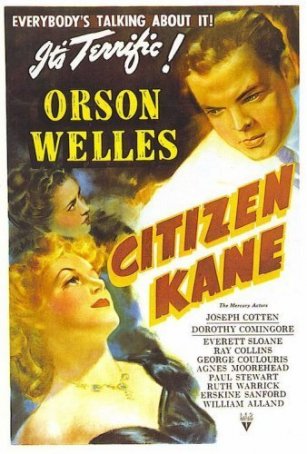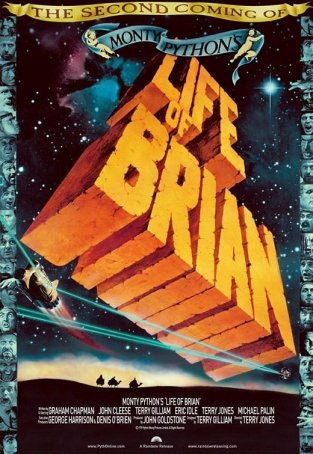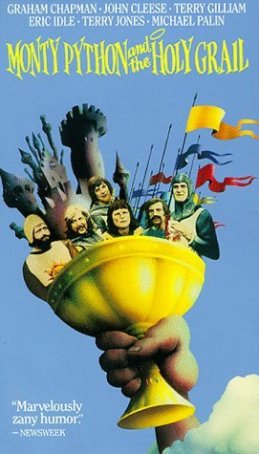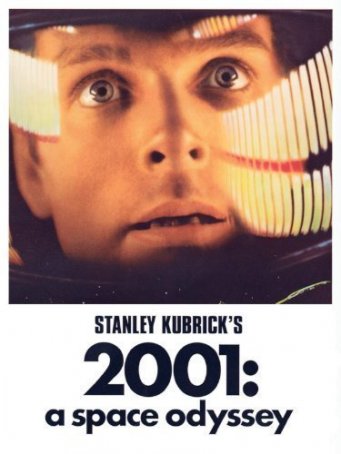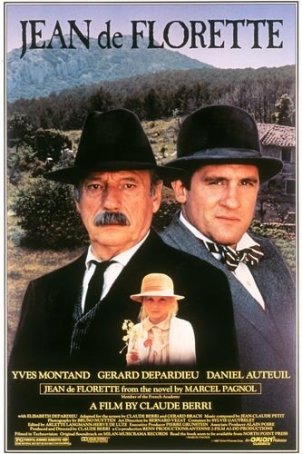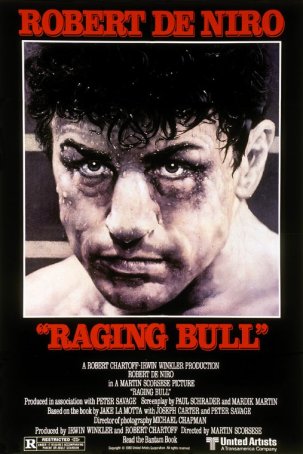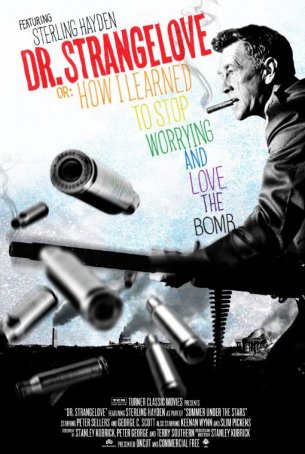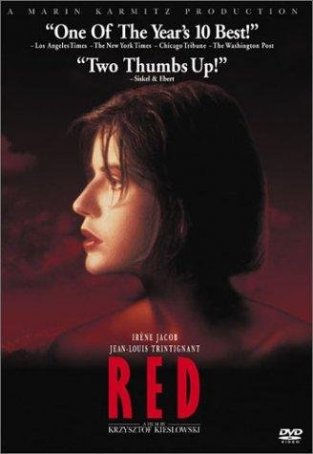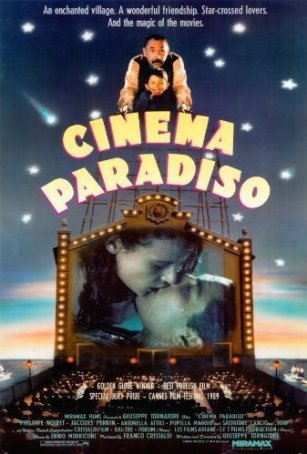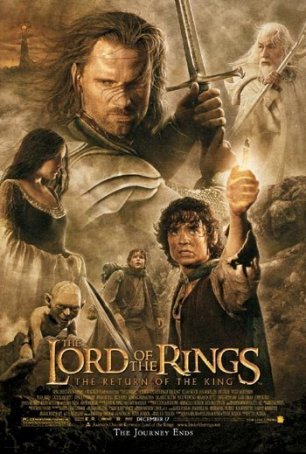James Berardinelli's All-Time Top 100
It has now been close to 13 years since I embarked upon what I called at the time my greatest challenge as a film reviewer: whittling down the nearly 6000 films I had seen (at the time) to the top 2%. I have no idea if I got it "right" or not, but the Top 100 that resulted from that effort remains one of my most notable personal accomplishments. Lists in general are meant to spur discussion and this one is no different. My sincerest hope, however, is that it will provide fodder for those in search of good movies to watch at home. Some are available on streaming services. I believe all (or at least nearly all) are available on Blu-Ray or "old-fashioned" DVD.
I started compiling the list in late 2001 (shortly after I returned from the 2001 Toronto Film Festival, the "9/11" festival) and had the order mostly completed by Christmas Eve. I began posting it, one title per week, in early January and completed it in late 2003. Here are some excerpts from the original introduction:
People love lists… Like everyone else, I have a soft spot for [them]. Perhaps because I'm an engineer by trade, I like organizing things, and lists are effective ways of doing that. Still, I don't pay much attention to any of the so-called "All Time" film rosters - whenever a prominent one pops up, curiosity prods me to check it out, but it doesn't mean much to me. I don't get upset if my favorite films aren't there - in fact, in many cases, I expect them to be absent. There's nothing more individual and personal than a Top 100 list. Attempts to quantify the Best 100 movies of all time are doomed to failure, since the words "quantify" and "art" are incompatible bedfellows.
So why am I making my Top 100 list available for the world to see? One reason is that, amidst all of the e-mails I get, this is one of the most frequent requests… Another reason is to highlight some underrated films by their inclusion (and, conversely, to do the same with some overrated films by their omission)…
Please note that the title of the list is my "Top 100 Films of All-Time" not the "Best 100 Films of All-Time". My ego is not large enough to allow me to claim to be able to compile the latter list. To date, I estimate I have seen about 6000 movies. That's a lot - more than many people see in a lifetime - but it also means that there are thousands of films I have not seen, and, with so many holes in my viewing roster, I can't even attempt to compile a comprehensive list…
Also, the list is a living thing. As I see more movies, it will evolve and change. When a great new film comes out, it may enter the list. Likewise, I may see and fall in love with an older movie. Thus, to start with, there are no runners-up. But, as other movies enter the list, those near the bottom will slip into runners-up status…
Some might assume that the list will be comprised solely of four star films. It is not. There are many four-star films to be found, but also quite a few with three-and-one-half stars. There are also a number of four-star films that didn't make the list. There's no definitive reason for this, except that the passage of time has, in some cases, enhanced or decreased my opinion of a particular movie…
So I have now reached a point when the "living list" needs to be revisited. Since I last revised the Top 100 a few years ago (adding Apted's Up Series and The Dark Knight), there have been some very good movies but, until last year, nothing that challenged me to change the list. 2013, however, brought two great films to my attention (one of which was released domestically in 2014) that warrant inclusion. They are: Before Midnight and Like Father, Like Son. The former is the third installment in Richard Linklater's Before series (it's currently a trilogy but that will likely change in another 8 years). It enters the list at #68, only a few slots behindBefore Sunrise. (Before Sunset didn't make the Top 100, although it would have made a hypothetical Top 200.) The latter is a Japanese film and features neither Dudley Moore nor Kirk Cameron. A masterful and emotionally potent exploration of identity and fatherhood from acclaimed director Hirokazu Kore-eda, this one is truly worth searching out. (As I write this, it is available for streaming.) It enters at #83.
The addition of two titles means that Vertigo and Dead Again slip into the growing pond of "Honorable Mentions." Technically, that means that the Top 100 is now the Top 109.
As of September 2014, here's the list as it stands, with links to the reviews:
U.S. Release Date: -
MPAA Rating: "NR" (Nothing Objectionable)
Genre: DRAMA
Director: Orson Welles
Cast: Orson Welles, Joseph Cotten, Dorothy Comingore, ...
The closer I get to #1, the more my choices will be second-guessed. That's okay for two reasons: (1) it comes with the territory, and (2) the list is opinion-based, so there's no right or wrong. (That statement might sound condescending, but you should read some of the e-mails I get about this list...) Over the past 30 years, nearly every critics' group that has cast a vote has named Citizen Kane as the best movie of all time. Objectively, that may indeed be the case, although I have no way of being certain. After all, my contention is that, in order to be able to name a movie the "best" of all-time, you have to have seen everything. I don't believe anyone qualifies. That's one reason this list is about subjective favorites, not objective quality. At any rate, I have a deep and abiding appreciation of Citizen Kane. Of course, it's one of the most influential films of all time (arguably second only to Birth of a Nation in terms of technical innovation), but it also tells an involving, compelling story and features a great performance (by Orson Welles). It is one of my favorites, although not quite beloved enough to crack the Top 10. I will admit that the first time I saw Citizen Kane (on television in the mid-1980s), I didn't understand what all the fuss was about. It took a few more viewings and a lot of reading to gain a full appreciation of the movie. For anyone who claims to love cinema, this is as iron-clad a "must see" as there is.
U.S. Release Date: 1979-08-17
MPAA Rating: "R" (Profanity, Nudity, Sexual Situations)
Genre: COMEDY
Director: Terry Jones
Cast: John Cleese, Eric Idle, Michael Palin, ...
The moment I first saw The Life on Brian on videotape in 1985, it became my favorite of the Monty Python movies. As I have said on numerous occasions, The Holy Grail is the funniest entry into the Python trilogy, but The Life of Brian has the most substance. When I began compiling this Top 100 list in 2001, I knew that The Holy Grail and The Life of Brian would both be featured on it, and that the latter would occupy a higher position. However, after re-watching both films back-to-back, I became aware of how close they were in terms of quality and overall impact. The Life of Brian ended up closer to #1 than The Holy Grail, but only by one spot. Some die-hard Python fans will disagree with this placement, and I respect their opinion. I can't strenuously object to anyone ranking The Holy Grail above The Life of Brian, although I don't agree. What would surprise me, however, is that anyone claiming to be a Python fan might not include both films in any kind of Top 100. (Eliminating The Meaning of Life is understandable, since, by Python standards, it is an inferior movie.) In my opinion (and that's what this list is all about), The Life of Brian and The Holy Grail are two of the greatest, most inventive motion pictures ever produced.
U.S. Release Date: -
MPAA Rating: "PG" (Sexual Situations, Profanity)
Genre: COMEDY
Director: Terry Gilliam, Terry Jones
Cast: John Cleese, Eric Idle, Michael Palin, ...
I was first exposed to Monty Python and the Holy Grail before I ever saw an episode of "Monty Python's Flying Circus." (In fact, it was in the same junior high school class where I first saw Patton, 2001, and The Great Escape.) My initial viewing left me nonplused – I wasn't sure what to make of the movie. Parts of it were certainly funny, but other scenes were simply... weird. (The knights that say "Ni?" A shrubbery? The air-speed velocity of an unladen swallow?) Of course, at age 12 or 13, my sense of humor had not developed, and, in order to fully appreciate Monty Python, a mature (and, at times, twisted) sense of humor is mandatory. Needless to say, when I revisited The Holy Grail some time during high school, I thought it was one of the most hilarious motion pictures I had ever seen. In addition to being laugh-aloud funny (to use the newspaper ad cliché), Monty Python and the Holy Grail is probably the second-most quoted movie (right behind Casablanca). Even those who have never seen the film are probably familiar with about a quarter of its lines. It has been said that you can determine how much of Python geek you are by how much of The Holy Grail you can quote. While I'm not nearly as familiar with the film as some of my friends, I can recite a few of the better bits. In terms of pure humor, nothing done by the Pythons as a group is funnier. The best skits in "Monty Python's Flying Circus" (such as "The Spanish Inquisition," "The Dead Parrot Sketch," "The Lumberjack Song," and "Defending Yourself with Fruit") are on par with The Holy Grail, but not superior. Which brings us to the natural question of which is the best Python movie. And, to answer that, I can only say... to be continued.
U.S. Release Date: -
MPAA Rating: "PG" (Violence, Profanity)
Genre: SCIENCE FICTION
Director: Stanley Kubrick
Cast: Keir Dullea, Gary Lockwood, William Sylvester, ...
Since its 1968 debut, movie fans have been divided in their opinions of Stanley Kubrick's masterpiece, 2001. There are those who think this is an incoherent, intentionally obtuse bore that may rank as one of the most overrated motion pictures of all time. Then there are those who view this as one of the most visually arresting, thought provoking science fiction films ever to reach the silver screen. Obviously, I am in the second camp. In addition to asking some really deep questions about life and the place of humanity in the universe, 2001 makes us believe that reaching for the stars is an achievable goal, not a myth. (Keep in mind that the film came out before a man walked on the Moon.) The film is made for science fiction viewers with patience. It's far closer to Solaris than Star Wars. This is yet another film that I grew to appreciate. I first saw 2001 when I was in junior high school. The video tape apparatus (circa 1981) was primitive, and the viewing screen was a 28" TV on top of a rolling cabinet at the front of a small auditorium. Not surprisingly, my enthusiasm was muted. In the advent of The Empire Strikes Back, I found this to be intriguing but slow, and the visual and audio poetry of the production was completely lost. Eight years later, when I saw the movie in a theater, I was amazed by the richness of the experience. This was not the 2001 I remembered from my childhood. One of the things I appreciated then and continue to appreciate about this movie is that every time I watch it, it provides new material for thought. Even amongst the best of films, that's a rarity. Finally, a note on 2010. It's an okay movie, but, because it is intended as a continuation of 2001, its straightforward approach and lack of artistry comes across as a letdown. The movie answers some questions, but I can't help but wonder if it wasn't better when the solutions remained mysteries. For those who see and enjoy 2001, 2010 is little more than a curiosity, and is not mandatory viewing.
U.S. Release Date: 1987-06-26
MPAA Rating: "PG" (Mature Themes)
Genre: DRAMA
Director: Claude Berri
Cast: Gerard Depardieu, Yves Montand, Daniel Auteuil, ...
This is a "two for one" pick in the Top 100, but it's easy enough to justify. Together, Jean de Florette and Manon des Sources (or, if you prefer, Manon of the Spring) represent a masterful telling of a single story. The split occurred because director Claude Berri believed that four hours was too long for viewers to comfortably sit in theaters, and he did not want to randomly cut scenes to make things shorter. This is sort of the same approach Miramax/Tarantino is taking for Kill Bill (except that it's harder to justify cutting a three-hour movie in half than a four-hour one with a natural break point). Jean/Manon has been a favorite of mine for a long time, although I didn't see it during its theatrical release. I watched Berri's films after being enraptured by the Daniel Auteuil/Emmanuelle Béart chemistry in Un Coeur en Hiver. Recognizing that they had previously appeared in Manon, I rented it. Before viewing it, I discovered that Jean was a prerequiste, so I rented that as well. Since then, I have owned copies of the movies in all three major formats: VHS, laserdisc, and DVD. I find the film so engaging that I am often able to sit through all four hours with only a brief interruption at the intermission. There are only two other four-hour movies I can make that claim for: Kenneth Branagh's Hamlet and Ron Maxwell's Gettysburg. On balance, Jean de Florette/Manon des Sources offers a better motion picture experience than either. It is beautiful, sublime, and emotionally powerful. In short, it is unforgettable.
U.S. Release Date: -
MPAA Rating: "R" (Violence, Profanity)
Genre: DRAMA
Director: Martin Scorsese
Cast: Robert De Niro, Joe Pesci, Frank Vincent, ...
It is with some embarrassment that I must admit to not having seen Raging Bull until 1998 – far after I had seen Scorsese's other well-known movies. I have never been interested in "boxing movies," and, even though I knew that a Scorsese film about a boxer would not be like any other director's film about a boxer, I wasn't interested. Then, in 1998, Roger Ebert came to town to do a shot-by-shot analysis of the movie, so I decided I should see it beforehand. I ended up watching Raging Bull three times within a week: once on DVD, once in a theater, and once in the Ebert shot-by-shot workshop (called, at the time, "Democracy in the Dark"). Once I had seen Raging Bull, I became one of its staunchest defenders (like a new convert to a religion). It is a brilliant motion picture, with as much depth as anything Scorsese has committed to the screen over the course of a long and fruitful career. Raging Bull isn't about sports; it's about human nature – the powerful, unstoppable, animalistic force that lurks deep within even the most urbane and cultured of us. For me, this is the director's best film. Others will argue for Taxi Driver or Goodfellas, and, while both of those movies rank in my Top 100, neither has a higher position than this one.
U.S. Release Date: -
MPAA Rating: "NR" (Sexual Situations, Mature Themes)
Genre: COMEDY
Director: Stanley Kubrick
Cast: Peter Sellers, George C. Scott, Sterling Hayden, ...
Watching Stanley Kubrick's Dr. Strangelove can lead to a depressing recognition. The movie is so brilliant, clever, and wickedly funny – as black and edgy a satire as has ever been filmed – that, by comparison, it makes most of today's so-called "comedies" seem like warmed-over leftovers fried in a microwave oven then left out in the sun to rot. The first time I watched Dr. Strangelove, in a social studies class in junior high school (circa 1979), I wasn't that impressed. After all, it was in – gasp! – black and white. Maturity and repeated viewings have radically changed my opinion. Only four years after seeing the movie for the first time, I was extolling its virtues during an oral presentation for a high school current affairs class. Like Peter Sellers, I took on various different roles for the report. Unlike Peter Sellers, I was horrible (although I did elicit a fair number of guffaws). The cold war is a thing of the past – as much an historical relic as the Berlin Wall – but its passing has not robbed Dr. Strangelove of its power or humor. Cautionary tales like this rarely go out of style, especially when they skewer their targets with such lethal force. "You can't fight in here! This is the war room!" By playing three roles, Sellers steals the show. Yet George C. Scott was so good as the pompous General Turgidson that he became a front-runner for a biography of Patton. Most experts believe that, had it not been for Scott's Turgidson, we would have seen another actor in the 1970 film. Many have wondered how long it would take for a Kubrick movie to make it onto the Top 100. This is the first, and there's another yet to come.
U.S. Release Date: 1994-12-16
MPAA Rating: "R" (Sexual Situations, Nudity)
Genre: DRAMA
Director: Krzysztof Kieslowski
Cast: Irene Jacob, Jean-Louis Trintignant, Frederique Feder, ...
Red represents the culmination of Polish director Krzysztof Kieslowski's Three Colors trilogy, and the conclusion of his magnificent career. (One final script, Heaven, credited in part to him was made several years after his death by German filmmaker Tom Tykwer.) My placement of Red on the Top 100 List should not be viewed as a slight to the other pictures in the series. Blue is a powerful meditation upon grief and White is a darkly comedic story of revenge. But, as good as those films are, Red is the transcendent one. In a way, this film's themes of love and fate summarize all of Kieslowski's career. Domestically, the three movies were released six months apart (Blue in December 1993, White in June 1994, and Red in December 1994), and I can recall awaiting the final chapter will ill-suppressed excitement. Unlike too many highly anticipated films, it did not disappoint. The moment I saw it, I knew Red would have a spot in my Top 10 for the year. Since then, my opinion of it has only grown. I suppose I could have cheated and grouped the three films into one entry, but, since Blue, White, and Red are distinct movies, it didn't feel right to do so. While there are certain thematic connections between them, each can stand solidly on its own. It is possible to experience Red to its fullest without having seen Blue or White. (Although, for anyone who does that, my guess is their next action will be to go out and rent to previous two entries.) For the longest time, Miramax Films kept these movies largely out of circulation. Finally, early this year, they arrived on DVD, causing much celebration amongst foreign and art film fans. Now, for those who missed it in the theater, the opportunity has finally arrived to see one of the greatest foreign films of the '90s.
U.S. Release Date: -
MPAA Rating: "PG" (Mature Themes, Sexual Situations)
Genre: DRAMA
Director: Giuseppe Tornatore
Cast: Philippe Noiret, Salvatore Cascio, Marco Leonardi, ...
In the North American market, there are two versions of Cinema Paradiso available. The first, released domestically in 1990, is a slimmed-down, trimmed-down version that was subjected to major cuts by Miramax Films to get it close to the two-hour running length. The second, the so-called "Director's Cut," arrived briefly in theaters during 2002 before being ushered onto DVD. The extended version is actually the one that was released in Europe during the late-'80s, so the 2002 edition was just a case of North America coming up to speed with the rest of the world. There's something to be said in favor of both cuts. The 1990 one is faster-paced and more concise, but leaves a major question unanswered: What about Elena? The 2002 one requires a little more patience, but is ultimately more rewarding. Cinema Paradiso is one of those movies that evokes powerful feelings of nostalgia, even for those who weren't around during the time period it depicts. Watching this movie, I wished (however momentarily) I had lived in that small town in Italy during the first half of the 20th century. The film is also about the love affair that we romantic human beings have with movies. I have said it before and I'll say it again: the kissing montage in Cinema Paradiso is one of my five favorite clips from any movie made at any time by any director in any genre. It is remarkable and has, on more than one occasion, brought tears to my eyes. Anyone who has skipped this movie because of a dislike of subtitles has done themselves a disservice. Go out, rent the DVD, and give yourself over to the experience. 30 minutes into the movie, you'll forget you're reading. By the end, you'll swear it was in English. How many non-English language films are that absorbing?
U.S. Release Date: 2003-12-17
MPAA Rating: "PG-13" (Violence)
Genre: FANTASY
Director: Peter Jackson
Cast: Elijah Wood, Andy Serkis, Bernard Hill, ...
The whole is more than the sum of its parts. Viewed as a single entity, Lord of the Rings trilogy marks a more impressive achievement than any of the movies alone. Combined, they offer the magic of discovery, the spectacle of epic battles, and the rush of emotion that comes with the final victory of good over evil. The tapestry is richer, the characters better realized, and the experience more immersive. The release of The Return of the King cemented this as nothing short of a cinematic milestone. Director Peter Jackson did not let things flag during the third installment - in fact, he ratcheted them up a notch. The Lord of the Rings has accelerated through the Top 100, indicating that the more complete it became, the better it looked. It stood at #98 when it was just The Fellowship of the Ring. When The Two Towers joined, it moved to #82. Now, with the trilogy complete, it is #20.
Every successful genre has its own definitive entry - a movie that energizes the public, satisfies the fans, and pleases the critics. Until 2001, one of the reasons fantasy has been regarded as the ugly stepchild of science fiction is because there has never been anything on the big screen to rival Star Wars. Oh, there have been fantasy movies, but most of them are silly and idiotic, like Willow and Dungeons & Dragons. Even the better ones - Excalibur, The Dragon Slayer, and the recent Harry Potter and the Sorcerer's Stone come to mind - haven't been great. But, in bringing J.R.R. Tolkien's milestone trilogy to the screen, Peter Jackson has finally given fantasy aficionados something to cheer about. I went into this movie with a mixture of excitement and trepidation, but left it exhilarated. Although it had been 20 years since I had last opened the books (I read them twice, at ages 12 and 14), many images remained fresh in my mind, and The Lord of the Rings matched them all. Almost everyone I have talked to, regardless of whether they have read the books or not, enjoyed the films. And, as the years go by, I expect that their importance will only grow.
